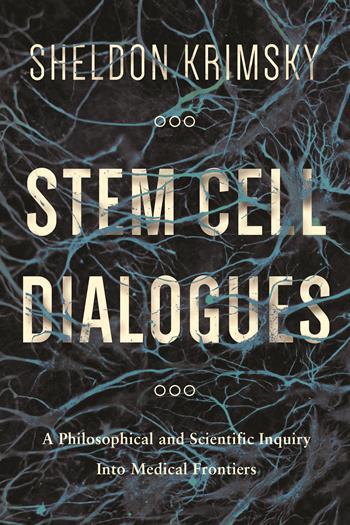Sheldon Krimsky on the Use of Dialogue in "Stem Cell Dialogues"
The following post is by Sheldon Krimsky, author of Stem Cell Dialogues: A Philosophical and Scientific Inquiry Into Medical Frontiers
In 1998 cell biology and medical research had entered a new stage of development. James Thomson of the University of Wisconsin isolated and cultured the first human embryonic stem cells (ESCs) from donated early stage human embryos. These cells have the potentiality of becoming differentiated into any other cells in the human body. The implications of this discovery are profound. ESCs could be harvested to regenerate damaged tissue, which cannot repair itself. Strokes, heart attacks, spinal cord damage, brain injury, and Alzheimer’s are but a few medical conditions that could potentially be treated with ESCs.
I first became aware of the promise of stem cell research in a class I co-taught with a colleague from the Tufts medical school who had been using stem cells to produce healthy skin. The class focused on the possibilities of human enhancement—covering the science as well as the social and ethical implications. The more I read about the science, the more I realized that medical research and therapy had embarked on a new voyage with new signposts of moral cautions. I did not have to wait very long before stem cells became an issue for presidential politics, feminist politics, right to life politics and even gender politics.
By the first decade of the millennium there were already dozens of books on the market. I could of course have taken a standard approach to combining a scientific narrative with ethical questions and bringing the issues up to date, that is, to 2015. By that point my wife had been immersed in playwriting. I also had been attending some of the plays performed in Cambridge at the Central Square Theater—a collaboration between MIT and two theater companies—that addressed scientific themes. I began thinking of an alternative way to investigate ideas in science and ethics for general readers. The works of Plato and Galileo, which I had read as a student of philosophy of science, came to mind. Could I present the complex issues of stem cell research and therapeutic applications as a set of dialogues?
The result is Stem Cell Dialogues, where fictional characters are engaged in discussions about real issues that fall in the intersection of science, politics and ethics. The one character who is ever present in the Dialogues is Rebecca Franklin, an MD, PhD, who has also studied bioethics. Dr. Franklin’s father became a quadriplegic after a fall from a ladder at a construction site. Since that time she began focusing her research to help improve her father’s paralytic condition.
One of the Dialogues presents Jewish and Catholic theologians facing off with a secular humanist on the moral status of embryos. In another, Dr. Franklin visits Germany to interview a scientist about his country’s policies on extracting embryonic stem cells from early-stage embryos. She also questions one of George Bush’s science advisors on the President’s stem cell policy. My goal in the Dialogues is to give the reader an opportunity to experience a wide range of arguments and methods of reasoning on stem cell research. The different points of view can be found spread throughout the scientific and philosophical literature and are footnoted so the reader can go to primary sources. I have chosen to give each voice respect and consideration so that readers can weigh the arguments and draw their own conclusions.


